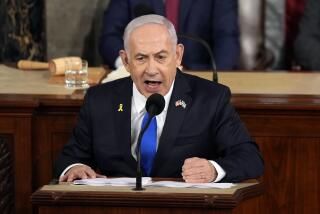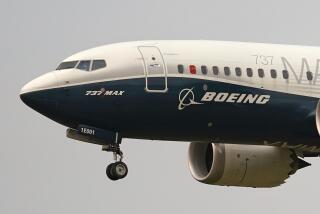Boeing Awarded NASA Contract Despite Recent Rocket Failures
- Share via
Boeing Co.’s troubled Delta rocket program got a boost Friday by winning a sizable portion of a long-term contract to build launchers for the National Aeronautics and Space Administration.
The pact not only extends NASA’s long-established use of the Delta family of launchers for planetary and other scientific missions, it also helps preserve thousands of Delta design and engineering jobs at Boeing’s plant in Huntington Beach.
NASA’s award also came only two days after Boeing said it would launch a mock payload aboard a Delta III in August in a bid to restore confidence among potential customers after two consecutive failures of the rocket.
Under the award from NASA, Boeing gets firm orders for three missions and options for five more, for a total value of $417 million. At the same time, NASA said it would put many more orders up for grabs between Boeing and rival Lockheed Martin Corp. Both were chosen to vie for potential future NASA missions under what’s known as the “indefinite delivery” portion of the contract, which calls for 62 more launches for NASA over the next decade.
The agency said Boeing and Lockheed Martin each would get at least one of those launches. If all 70 of the missions are launched, the value of the entire NASA contract could reach $5 billion.
“This really does reaffirm NASA’s confidence in our launch vehicles,” said Boeing spokesman Walt Rice in Huntington Beach, where about 10,000 designers and engineers work on both the Delta family of launchers and the space shuttle program. However, the pact is not expected to increase Boeing’s Delta work force at the site, he said.
Although the Delta rocket has long been a workhorse for NASA, the Air Force and commercial customers, the failures of the new Delta III hinted that Boeing might be more vulnerable to competitive launchers made by Lockheed Martin and Arianespace of Europe, among others.
But NASA didn’t have many options in choosing its rockets, asserted Jon Kutler, president of Quarterdeck Investment Partners, an investment banking firm in Los Angeles that focuses on the aerospace industry.
It’s highly unlikely that NASA would have awarded the entire contract to a foreign operation such as Arianespace, or to just Lockheed Martin because that company is having operational problems of its own, he noted.
“So yes, it’s a boost in the arm for Boeing, but it’s also a mutual-protection society” between Boeing and NASA, Kutler said. “NASA has a lot riding on this [Delta] program, too.” NASA has flown 82 missions aboard Delta rockets since 1961.
A Delta III exploded in August 1998 and destroyed a PanAmSat Corp. satellite, a failure later blamed on faulty control-system software. Then in May 1999, an engine combustion chamber cracked on a Delta III, leaving an Orion 3 satellite built for Loral Space & Communications Ltd. in a useless orbit.
Boeing is now ready to launch another Delta III, but payloads from potential customers aren’t immediately available. So the Seattle-based aerospace giant said Wednesday that it would launch a mock payload aboard a Delta III anyway--a payload similar to the Loral satellite it carried--to keep the program going and to prove the worthiness of that rocket and the larger Delta IV.
“We felt that by waiting . . . we might be passing up some opportunities to sell Delta III or Delta IV launch services,” Rice said. The quoted price for a Delta III launch is about $85 million, which Boeing will have to bear itself.
The award was announced after financial markets closed. Boeing’s stock closed earlier at $39.25 a share, down $1.13, and Lockheed Martin’s stock fell 69 cents a share, to $24.31, both in New York Stock Exchange composite trading.
More to Read
Inside the business of entertainment
The Wide Shot brings you news, analysis and insights on everything from streaming wars to production — and what it all means for the future.
You may occasionally receive promotional content from the Los Angeles Times.











